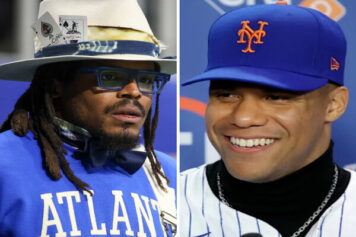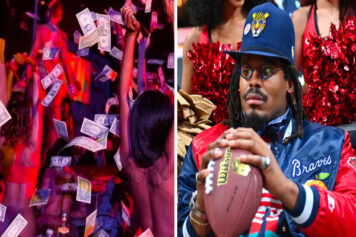Two weeks ago, as I watched my New York Giants take on the Carolina Panthers at an Applebees in Brooklyn, I found myself rooting for Cam Newton. Not the Carolina Panthers, per se. But Cam.
At 6-7, the Giants were in the hunt for a wild card berth and a win over the Panthers could have strengthened their resume. But a victory would have blemished Cams perfect record and I didnt want to see that.
As much as I wanted to see Big Blue in the playoffs after a two-year absence, I dont want it to be at the expense of seeing Cam go 16-0. Let me just be honest: My black pride superseded my fandom last week and I dont feel bad about it at all.
A black quarterback like Cam going 16-0 was far more important than seeing my Giants make the playoffs this year. Many other patrons seemed to share my thinking, even though they didnt explicitly voice it. They may not have been outright screaming, Go Cam!, but they voiced the significance of him finishing the season with a perfect record.
Over the three years that Ive watched sporting events at this Applebees location, Ive noticed a low tolerance for those who root against New Yorks teams. Not that day. If you were rooting for Cam, you were rooting for black people. No one would consider you anti-New York for wanting to see a brother succeed.
This is not unusual, though.
Throughout sports history, black people have often rooted for the black person to win, especially if his or her win would lead to a first. Black people celebrated the significance of Jack Johnsons becoming the first black heavyweight champion of the world in 1908, in an era in which white men refused to give black boxers shots at the title.
We didnt have to be boxing aficionados to appreciate the significance of Joe Louis losing to Germanys Max Schmeling in 1936. America was still suffering through the Great Depression and black America was feeling the worst of it. But when Louis won his rematch against Schmeling a few years later, no group was more buoyant than black Americans, who internalized the meaning of his defeat over the symbolic embodiment of white supremacy.
When Tiger Woods turned pro and won tournament after tournament, many black people werent golf fans. I was a 17-year-old kid living on the West Side of Detroit when he won the Masters. I didnt have any interest the game and thought it was boring until I saw him obliterating the competition and changing the face of the game.
Of course, Tiger disappointed us with his Im Cablanasian self-identification, but we still claimed him as that lone brother in golf who was reppin for the people, even though he didnt see himself as our skinfolk.
And who could forget Super Bowl XLI, in 2007, when Lovie Smith and Tony Dungy became the first two African-American head coaches to lead their teams to the Super Bowl. Though the commentators didnt make much of the historic milestone, two black businessmen out of Texas coined the game the Soul Bowl and started selling t-shirts with the phrase printed on the front. That was the year many black people didnt care who won because, in the end, a black head coach would become the first to win a Super Bowl.
(Photo credit: Getty Images)
When Serena and Venus Williams turned pro, they represented Compton and black culture through and through. They began to dominate tennis and were unabashedly black in the process, as Serena showed when she Crip Walked at Wimbledon after winning the Olympic gold medal in 2012.
Though I appreciate the sport of gymnastics, it never interested me until I saw Dominique Dawes win bronze (individual) and gold (team) medals during the 1996 Summer Olympics. And I really didnt resume my interest in gymnastics until Gabby Douglas won gold in the 2012 summer games.
Seeing black people succeed draws other black people in to cheer them on. We may not always appreciate the sport in which theyre performing, but we have a keen sense for the stakes if they win or lose. Because American racism rarely allows black people to compete on an equal playing field in most professions, we tend to hold black athletes and their successes in high regard because sports is, in my opinion, the most meritorious profession in American life.
When given a chance, we can punch out any fighter in the ring, out-throw any QB in the league, outperform anyone on a gymnastics floor, or outwit any player across the tennis net.
Even though its 2015, we still root for the black person to succeed. Were clocking in hours at our corporate jobs, the local manufacturing plant or other gigs that help us pay our bills. The racism we deal with at our 9-to-5 jobs is a daily reminder to us all that the meritocracy that many athletes enjoy is a perk well never enjoy.
We treasure the fact that athletes like Cam, Serena, Gabby and others can, especially in the face of the very real racism that they themselves experience in their fields. Tennis, gymnastics, golf and other sports are out of reach for many Black people because of the steep financial commitments. So when they are able to overcome those financial and societal obstacles to thrive, we feel like they are thriving for the rest of Black America.
Ill be cheering for the Jets for the rest of the year. Not because I am dropping my Giants for the winning team but because head coach Todd Bowles needs to rack up one more win for his team to make the playoffs.
Ill be cheering on Marvin Lewis and the Cincinnati Bengals and Mike Tomlin and the Pittsburgh Steelers too. The more black coaches in the playoffs, the more their success can help others get a shot at being an NFL head coach.
I want my Giants to succeed, but, when it comes to a black coach or a black quarterback like Cam, Ill root for them every time. Even if they’re playing against my team.
And I dont feel bad about it, either.




